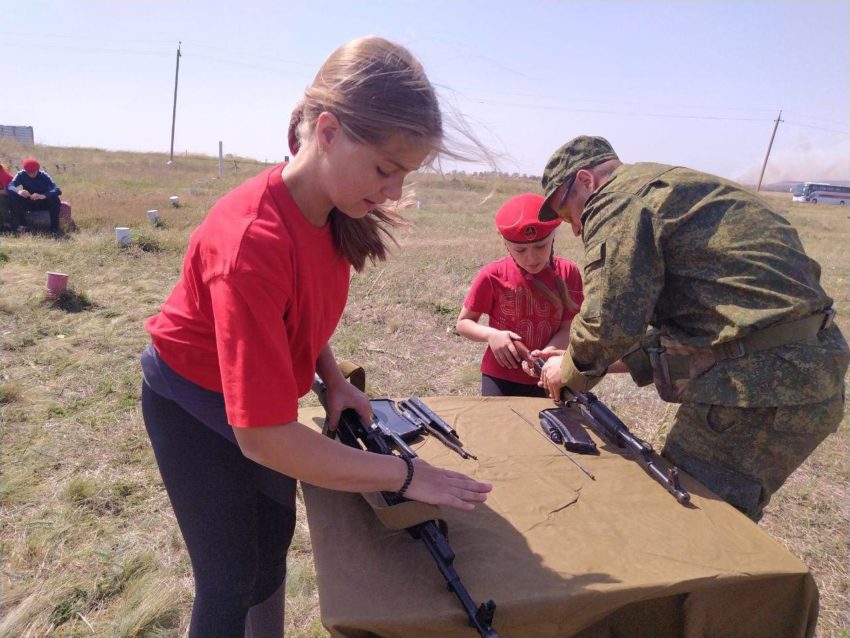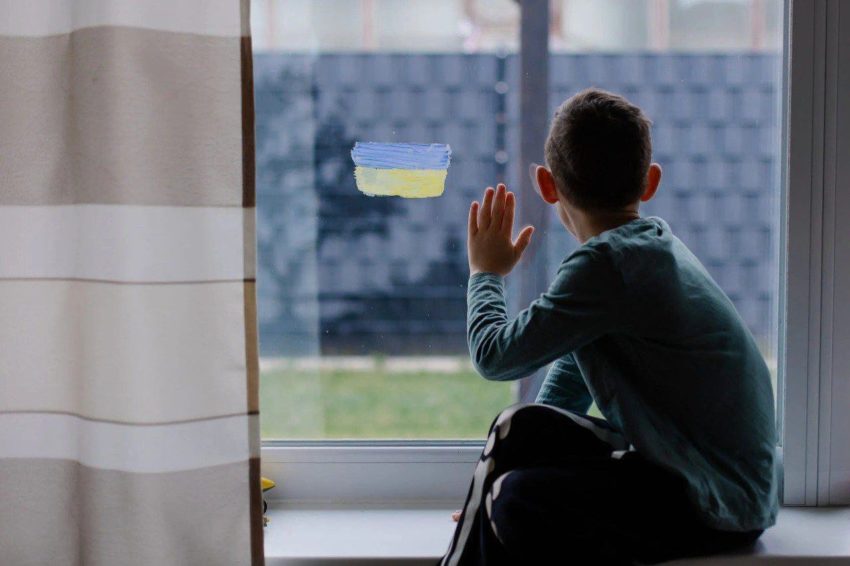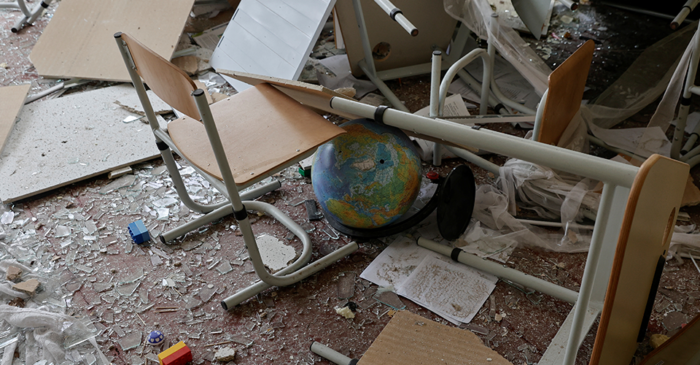Like in Nazi Germany, the Russian occupiers terrorize civilians, their children, and schoolteachers, and burn "undesirable" books. After seizing control of Ukrainian schools in occupied territories, they threaten schoolchild deportation and attempt to coerce teachers into teaching by the Russian program which will "knock the Ukrainian heresy" out of the schoolchildrens' heads, including by Orwelian-like "political minutes."
“All the supporters of Ukraine are traitors. If Ukraine remains independent, evil will invade it.”Russian authorities in Ukraine teach schoolchildren to despise their homeland. With the full-scale invasion of Ukraine, Russian propaganda has changed. Before the war, its main objective was to target domestic and international audiences. Western policymakers had to question whether the annexation of Crimea and the occupation of eastern parts were unjustified. The idea of "restoring the great Soviet Union" should have convinced Russians to support the invasion. Since Russia invaded Ukraine, the objectives of propaganda have expanded. Today's disinformation campaign includes erasing the Ukrainian identity and brainwashing children. To accomplish these objectives, Russian soldiers seized control of the Ukrainian education system in occupied oblasts. Civilians who oppose the new policy face torture and kidnapping.
Raising "perfect soldiers" for the war against Ukraine
On 28 August, Ukrainian Intelligence reported that Russian authorities in Luhansk Oblast issued an instruction to teachers. It required that the occupied territory's new academic year begin with a history lesson. The lesson plan document included Russian propaganda narratives that attacked Ukrainian national heroes that were crucial for Ukraine's self-determination, claimed that the Ukrainian language "doesn't exist," and that the war in Ukraine is actually the West seeking to undermine the stability of Russia. In addition, to increase the impact, the Russian authorities introduced so-called "political minutes," a form of propaganda immortalized in George Orwell's "1984" as "two minutes of hate" and widely used in the USSR to slam the Soviet Union's capitalist enemies. During these "minutes," teachers in Berdiansk, Zaporizhzhia Oblast, searched for Ukrainian activists among students' friends. They asked tricky questions and sifted through the contacts in children's phones, reported Head of Military Administration Victoria Halitsyna. In occupied Crimea, the attendance of political minutes is obligatory. Teachers divided the lessons by grade level. The junior school is taught distorted facts about "Russian war heroes" and "Russia's friends and enemies." Teachers also inform senior students about the benefits of Russia's military contracts. To sum up, the political minutes aimed to indoctrinate Ukrainian children. Russian schools employ these lessons to prepare students for death on the battlefield rather than a happy life from an early age. Russian occupiers also devised another plan to Russify Ukrainian children in Donetsk Oblast. They take students who have free time to boot camps.
Nazi-like book burning
Russia's war against Ukraine mirrors Nazi Germany's invasion. Both dictatorships terrorized peaceful civilians in occupied territories and burned "undesirable" literature. Russian forces began seizing books in Luhansk, Donetsk, Chernihiv, and Sumy Oblasts as early as the first month of the war. They confiscated literature about the Euromaidan revolution and the Donbas war. Ukrainian officials have reported on book burning during the last eight months of the war. The adviser to Mariupol's mayor, Petro Andriushchenko, reported in May that Russian forces confiscated literature from libraries in Donetsk Oblast. "The youth of Donbas are opposed to extremism," explained occupation authorities. According to them, books about Ukraine's history were on the extremist list. On 20 September, the National Resistance Center informed that Russian soldiers continued confiscating literature in Melitopol. In particular, children's books because they promote "Nazi values."Russian soldiers force parents to send kids to attend Russian schools
In occupied territories, Russian invaders are desperately attempting to increase school enrollment. They offer a $160 incentive to parents who allow their children to study in Russian schools. If that does not work, they threaten deportation. Olga left Kharkiv Oblast before the Ukrainian Army liberated it, fearful that Russian soldiers would take her children away."They threatened to deport children if they remained home," she recalled. "As far as I know, during the first lesson, teachers told students that 'Ukraine is the enemy' and 'Ukrainians are Nazis.' They claimed that Russia was liberating Ukraine from them," said Olga.The conditions offered by occupation authorities are dangerous. When students enter the classroom, Russian soldiers lock the school's doors.
"Our children spend the entire day in captivity," said Ivan Fedorov, Mayor of Melitopol in Zaporizhzhia Oblast. "Chechen fighters guard the entrance and prohibit parents from visiting their children," he added.

Teachers are learning propaganda on "special" courses in Crimea and Russia
At the beginning of the war, Ukrainian teachers faced a dilemma. Whether to collaborate with Russian authorities, leave occupied territories, or hide? Russia offered the so-called retraining courses for those who decided to work under a new education program. Instantaneously, the retraining became a major news story thanks to the propaganda Telegram channels. One of the channels claimed that teachers who pass the course will later"knock Ukrainian heresy out of their heads."However, many Ukrainian teachers refused to collaborate with the occupying authorities. That is why Russia sent its teachers to the occupied territories. More than 500 Russian teachers arrived in occupied territories right before the start of the academic year, drawn by higher pay. According to Melitopol's mayor, they were tasked to sing the Russian national anthem and raise the Russian flag before classes.
Children who don't want to be part of the Russian world attend Ukrainian classes online
As a form of clandestine protest, children in occupied territories attend the Russian school by day and study the Ukrainian curriculum in the evenings remotely. Iryna, a teacher from Nova Kakhovka, left the occupied territory and conducts lessons online for the pupils who remain in the region. The ones who stayed under occupation do not hold such lessons because of the bad internet connection and danger from the Russian troops, she said in an interview with Euromaidan Press."Out of concern for their children’s safety, parents in occupied territories enroll them in Russian schools. At the same time, students immediately wrote to me that they would study in two schools simultaneously," Iryna explainedAccording to her, the vast majority of Ukrainian teachers avoid any collaboration with Russian authorities.
"Except for one teacher, the entire staff refused to cooperate with the Russian occupiers," Iryna saidLocals who learned of the teacher's decision to collaborate with the Russians posted her bio on the "Traitors of Skadovshchyna" channel. This popular Telegram group was formed to shed light on the activities of collaborators in southern Ukraine.

"If they can't open the door, they storm into an apartment. Once, I saw a Facebook post from my colleague. She worked in a kindergarten as a speech therapist. She absolutely had no ties to the Ukrainian security services. The Russian occupiers smashed the doors and conducted the search. I don’t know what they expected to find in the speech therapist's apartment, " said Iryna.The Head of the Kherson Regional Military Administration confirmed that Russian forces employed violence as a weapon against teachers. Two female teachers, he claims, were kidnapped in Nova Kakhovka. They were held captive for a long time. The intimidation of parents who refuse to send their children to school also continues. Russian occupying forces threaten them with the confiscation of their property. At the same time, they offer a $65 incentive to parents who enroll their children in Russian schools. Parents remain reluctant to send their children to such schools despite the monetary incentives.
How does Ukraine aid the education of children despite the war?
As of 13 October, almost 100,000 students from occupied territories enrolled online in the Ukrainian education program. The Minister of Education and Science, Serhiy Shkarlet, stated that Ukraine's primary task is to ensure that no child of school age is left behind amid Russia's brutal war. Yet, in some territories, Russian occupying authorities found out about remote education. Russian hackers attempted to breach the education platform in Melipotol."But they were unsuccessful," the mayor reported.Furthermore, Ukraine continues to support teachers.
"There are some teachers who refuse to cooperate with occupiers. They receive two-thirds of their salary from the Ukrainian government despite not teaching any subjects," remarked Iryna. "My colleague who stayed there erased all the information about her 'previous' job from her laptop, as Russian soldiers were persecuting Ukrainian teachers. They were capturing and torturing teachers in the basements."Since the beginning of the invasion, Russian forces have killed 428 children. To protect the lives and futures of the most vulnerable, Ukraine must continue liberating its territories.
Read more:
- “Children arrived with bits of shrapnel in their scalps.” Ukrainian doctors recount horrors of Bucha
- In Zaporizhzhia Oblast, children study in school where Russian occupiers live – Ukrainian General Staff
- Most Ukrainian schoolchildren will continue studying online
- Propaganda textbooks found in Kharkiv Oblast praise “great reunification of Crimea with Russia,” humiliate Ukraine
- How Ukraine is preparing a Tribunal for PutinUkraine launches portal to find children deported to Russia
- Russian war crimes: "denazifying" Ukrainians through deportation, torture, detention, and filtration camps

